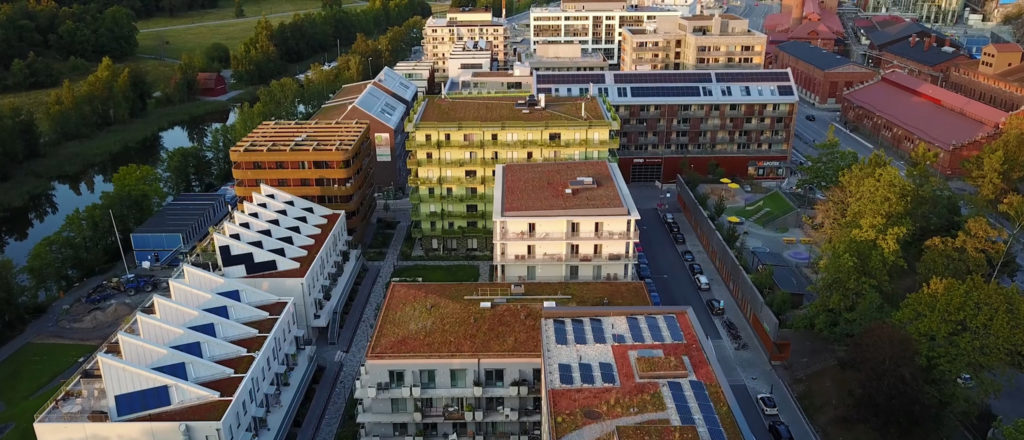The demand for heat pumps has grown strongly in Europe during the past years, and through high efficiency heat pumps contribute to the decarbonisation of heat. Heat pumps can be integrated to sustainable district heating and cooling networks and enable the use of alternative and renewable energy sources.

District heating and cooling offers a sustainable way to regulate indoor temperatures, as heat is taken from one source and moved to another. With the advent of 4th and 5th generation of district heating, the temperature of the transported heat has gone down while the networks’ efficiency have gone up. The heat transported in the 4th generation reaches temperatures around 50-60 degrees Celsius, and temperatures in the 5th generation are even lower at around 8-25 degrees Celsius. This low heat allows for an integration of both heating and cooling. In many cases district heating networks are powered by a central combined heat and power generating plant, but they can also be supported by heat pumps. Below you will find five things you should know about heat pumps and how they can act as a good complement to district heating:
According to the European Heat Pump Association (EHPA), EU-21 has a heat pump stock of 13.3 million units contributing to 144 TWh thermal energy, out of which Sweden produced 16.8 TWh or approximately 9%. In EU-21 heat pumps are now heating almost 10% of all buildings and the yearly sales of heat pumps grew by 69% from 2014 to 2018.
Heat exits in low and high temperatures and heat pumps have the capacity to transform the former to the latter. For example, during winter times, low temperature heat is captured from sources such as air, water and ground in order to heat a building, while in the summertime, high temperature heat is taken out of that same building in order to cool it. Basically, a heat pump captures heats, regulates its temperature through compression or condensation, and then distributes the heat to the desired place.
Compared to other heating technologies heat pumps have a very high efficiency, generating thermal energy three times larger than the electricity it consumes. Given that the electricity comes from renewable sources, heat pumps are a very environmentally friendly option and it is no surprise that heat pumps according to the EHPA contribute to an annual reduction of 9.16 million tons CO2 emissions in the EU.
Heat pumps can successfully be integrated for heat generation to a district heating network. Benefits include the capture of low energy alternative heat sources and integrating them into a district heating network, where the heat pump acts as an enabler for the alternative heat sources. Heat pumps can also be used as a link to electricity grids and to capture heat from renewables.
Through heat pumps alternative heat sources such as geothermal, solar and waste energy can be incorporated into district heating networks. Some examples of this are South Tyneside’s initiative to make use of old coal mines as a source of geothermal energy to heat the council’s buildings, as well as Vattenfall’s partnership with Cory Riverside Energy to capture waste heat and distribute it to more than 10,000 South London homes. Find more info about this in our April newsletter>
To stay updated on news for sustainable heating and cooling, follow us on Twitter and LinkedIn, and subscribe to our Newsletter.
Sweden is at the forefront of decentralised heat networks technology. Our aim for “Sustainable Heating & Cooling by Sweden” is to facilitate knowledge sharing between British, French and Swedish stakeholders and develop and encourage environmental and economic best practice.
To find out how we can help you and your organisation, please contact our London or Paris-based “SHC” teams. We can introduce you to leading consultants, suppliers of technology and services who will be pleased to share know-how of the development of sustainable heating & cooling solutions.


